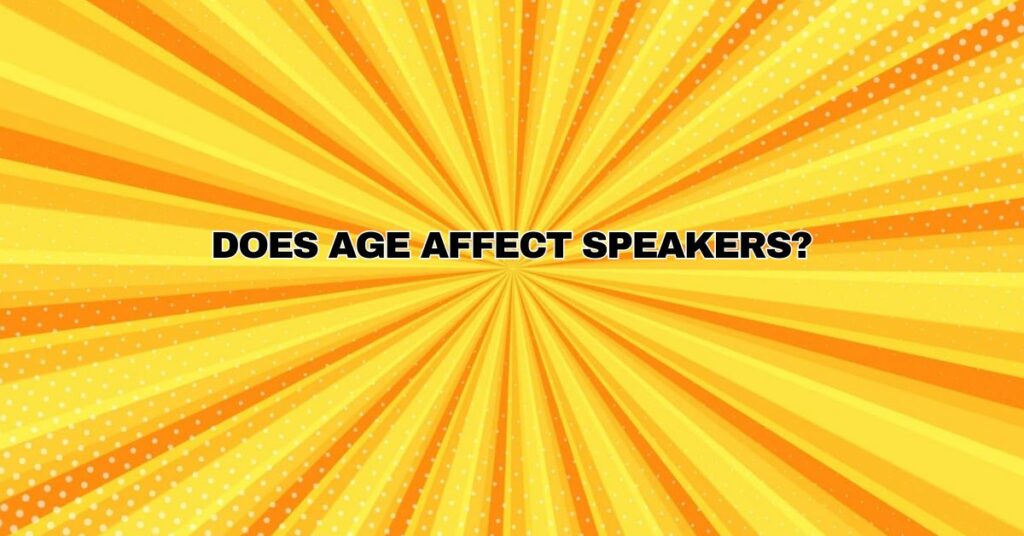Speakers, the workhorses of audio systems, play a crucial role in delivering sound experiences that captivate and immerse us. However, like all things, speakers are not immune to the passage of time. In this article, we will explore the ways in which age can affect speakers, both positively and negatively, and how proper care and maintenance can extend their lifespan and performance.
The Lifespan of Speakers
Speakers are complex electromechanical devices that generate sound by vibrating diaphragms (cones or domes) to create air pressure variations, thus producing sound waves. The lifespan of speakers depends on various factors, including their design, build quality, usage, and maintenance.
1. Design and Build Quality
High-quality speakers are designed and constructed to withstand the test of time. They feature robust materials and engineering that can prolong their lifespan significantly. Conversely, lower-quality speakers may exhibit signs of aging sooner due to inferior components and construction.
2. Usage
The way speakers are used can greatly impact their longevity. Constant high-volume usage, exposure to extreme temperatures, and overdriving speakers with too much power can lead to premature wear and damage.
3. Maintenance
Regular maintenance and care can extend the lifespan of speakers. This includes keeping them clean, ensuring proper connections, and addressing any issues promptly.
Positive Effects of Age on Speakers
While age can potentially lead to wear and tear, there are some instances where it can have positive effects on speakers:
1. Speaker “Break-In”
New speakers may undergo a “break-in” period during which their performance improves over time as the components settle into their optimal positions. This can result in more accurate sound reproduction.
2. Vintage Appeal
Some vintage speakers acquire a unique sonic character over the years that appeals to audiophiles. The aging of components can lead to a warm and nostalgic sound quality that enthusiasts find pleasing.
3. Collectible Value
Older, well-maintained speakers from reputable brands can become valuable collector’s items. Owning vintage speakers can be a point of pride and a piece of audio history.
Negative Effects of Age on Speakers
Age can also lead to negative effects on speakers, including:
1. Cone or Diaphragm Deterioration
Over time, the materials used in the speaker’s cone or diaphragm can degrade, resulting in reduced sound quality and, in some cases, distortion or buzzing.
2. Surround Decay
The surround, the flexible ring that connects the cone to the speaker frame, can dry out and become brittle with age. This can lead to a loss of flexibility and compromised sound quality.
3. Component Failures
Age can cause electrical components, such as capacitors and resistors in crossover networks, to degrade or fail. This can affect the speaker’s ability to accurately reproduce sound.
4. Cabinet Aging
Wooden speaker cabinets can warp or crack over time due to changes in humidity and temperature. This can impact the speaker’s structural integrity and, consequently, its sound quality.
Maintaining and Preserving Speakers
Proper care and maintenance are essential for preserving speakers and mitigating the negative effects of age:
1. Cleaning
Regularly clean speaker components and enclosures to prevent dust and dirt buildup, which can affect sound quality.
2. Inspection
Periodically inspect speakers for signs of wear, damage, or loose connections. Address issues promptly to prevent further deterioration.
3. Humidity Control
Maintain a stable humidity level in the room to prevent wood cabinets from warping and to protect speaker components from moisture damage.
4. Proper Storage
Store vintage speakers in a cool, dry place away from direct sunlight and extreme temperatures when not in use.
5. Professional Maintenance
Consider having speakers professionally serviced or refurbished by a qualified technician, especially if they are valuable or rare vintage models.
Conclusion
Age can affect speakers in both positive and negative ways, depending on various factors. While some speakers may acquire a unique vintage appeal over time, others may experience deterioration in performance and physical condition. The key to preserving speakers and maximizing their lifespan is proper care, maintenance, and responsible usage.
Investing in high-quality speakers, irrespective of their age, can provide a rewarding listening experience for years to come. Whether you prefer the warmth of vintage sound or the precision of modern audio, speakers remain indispensable components of our audio journeys, enriching our lives with music and soundscapes that continue to resonate across time.


